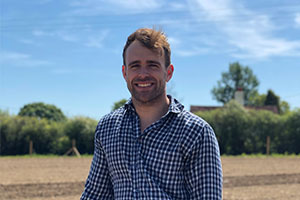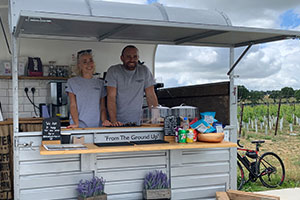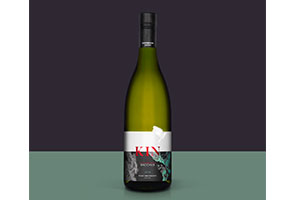‘It’s been a great first year at the vineyard, albeit a strange one’
Joe Beckett, from Kinsbrook Vineyard, tells editor Victoria Galligan about how his family became winemakers after years of running a chicken farm…
Tell us a bit about the background of the farm…
It started with my grandparents who came to the UK from Ireland in 1969 and bought a redundant chicken farm in Sussex. They brought it back to life and reintroduced chickens. My grandfather was the eldest of four siblings, many of whom were a bit unconventional. My grandfather walked the fine line between genius and madness, which he harnessed and coupled with hard work to make the farm a success.
My dad took over in 1980s and helped to expand the farm to a more complete agricultural business. My elder brother Sam and my dad now run the farm, although my grandfather can still sometimes be found fixing broken machinery.

When and why did you decide to diversify into winemaking?
As with most agricultural businesses these days, we found ourselves wanting to expand the family farm and diversify to balance the poultry side of the business. But as a family, we didn’t have the time or finances to diversify. After university (I studied zoology), I went travelling and ended up in New Zealand in 2016. I visited Waiheke Island, which has expanded rapidly over the past few years. It’s a fantastic wine area with some really good wines which has brilliantly harnessed the tourist market too. I loved the concepts I saw there of creating a visitor destination where people can come, tour the vineyard, sample the wine where it’s grown, enjoy a meal and have a full, family day out.
So I came home, and started looking at the options for setting up a vineyard. My parents were very supportive. My father is all about progress, he’s a very forward-thinking person. They’re always asking ‘What’s the next thing?’ It breeds a level of ambition. We had a site in West Chiltington, which my grandfather had bought in 1979, which wasn’t being used. That’s where it all started.
What kind of conditions are needed to create a vineyard in the UK?
There are several key factors you need to consider:
• The field’s aspect/ orientation: in the northern hemisphere south/ south east is ideal. Obviously this is the other way round in the southern hemisphere. A slope is good as it increases radiation from the sun. But flat is ok. A water course at the bottom of the field can help drain water out of the site and can equally regulate temperature.
• Soil health and structure: any type of soil has its own problems and its own merits. Clay, which is what we’re on here, can have drainage issues, for example. However, you can mitigate this by land drainage installation. Clay has got strong nutrient holding capacity and better heat retention. Any soil type is fine, you just need to know how to manage it.
• Altitude: too high an altitude and that can limit the temperature in the vineyard. Too close to the coast and there can be too much salt in the air.
• Location: I like being on a decent thoroughfare as we get plenty of passers-by who stop for a coffee and cake at our converted horsebox and we can then talk to them about the wine. It’s also good for staffing as people can get to us easily. If you’re in a really remote area, then your staffing pool is going to be greatly reduced.
• Proximity: Personally, I like to live close to the vineyard so that I can be there in a couple of minutes. Also, if I see outside the window that it’s raining, and then spot a problem in the vineyard a few days later I can think back to the rain. It’s useful when you’re out there in the spring at 3am burning pallets to keep the frost from the vines if you only have a short distance to stagger home.

Who do you sell the wine to (direct to public or wholesale etc)?
We have a mixture of options. We currently sell direct through our website, and on site through our converted horsebox outside West Chiltington. We’ve just started talking to restaurants and other retailers and eventually we’d look to sell to supermarkets but our current scale doesn’t justify this wide an expansion.
Were you pleased with the debut vintage? Has it been a popular seller?
We were completely blown away by the debut vintage. Everything we had orchestrated over the last few years came together to create the perfect blend. Our Sparkling Vintage Cuvée boasts a mouth-watering crispness with aromas of orchard fruit. This is beautifully overlaid with toasted brioche and honeyed almonds, characteristic of a wine which has been aged for five years on lees. The Bacchus grape is ideally suited to England’s cool climate and our expression of this is through a low-alcohol wine (10.6% ABV) infused with mouth-tingling acidity and herbaceous notes. Meanwhile the semi-aromatic Pinot Gris is a highly-complex, clarity-driven acidic wine with notes of apple, stone fruit and sweet spices. We wanted the wine to be a bit different, to stand out as a more contemporary, minimalist wine.
You're the youngest vineyard owner in the country – how could more young farmers be encouraged to follow you?
If you have a good existing farm and want to go into viticulture, then go for it. It’s another string to your farming bow. Young people shouldn’t be put off by the fact that viticulture is a traditional business. Keep your existing farming going, add viticulture too and then you can decide whether to opt for one or the other or do both. We still have a successful poultry farm in addition to the vineyard, for example.
YouTube is your friend – l learnt loads through YouTube. Don’t be afraid to ask people. I spoke to loads of other vineyard owners and managers and they were all incredibly friendly and helpful. Read as many research papers and books as you can within the viticultural field, and Plumpton College also runs fantastic seminars and courses.
What are your plans for the future of the business?
From small acorns, mighty oaks grow. Or in our case from small vines, plump grapes grow which in turn become wine. I have a vision to create a premium tourist destination at our vineyard with something for every member of the family. At the moment we have the converted horsebox at the vineyard. We’re soon having an indoor/ outdoor seating area and will have a harvest day in October where people can see the grapes being picked and pressed by the team. I want to make the wine world more accessible and the vineyard more approachable to a wider audience. Next year, we will hold our first wedding at Kinsbrook Vineyard and we’re hoping to build a wine cellar door/farm shop/ café overlooking the vineyard, which would open next autumn. Next summer will see summer dinners in the vineyard together with glamping opportunities.

How has the coronavirus lockdown affected your business?
We were able to adapt quickly and came to market with a converted horsebox, which I worked on over the winter months with Erik, Kinsbrook’s head of hospitality. By serving coffee and cake (before our wine was available) to walkers, cyclists and other passersby before other cafes were open, we got people interested in the wine and created an amazing and loyal customer base.
Because of lockdown, we had a few issues with our packaging which meant we bottled our wine later than expected. We also weren’t able to launch our dinner series – we’d planned summer dinners in the vineyard – but we’re hoping to do that next year instead. We’ve also recently launched vineyard tours just a little later than expected. So it’s it has been a great first year in general, albeit a strange one.
- Log in to post comments

